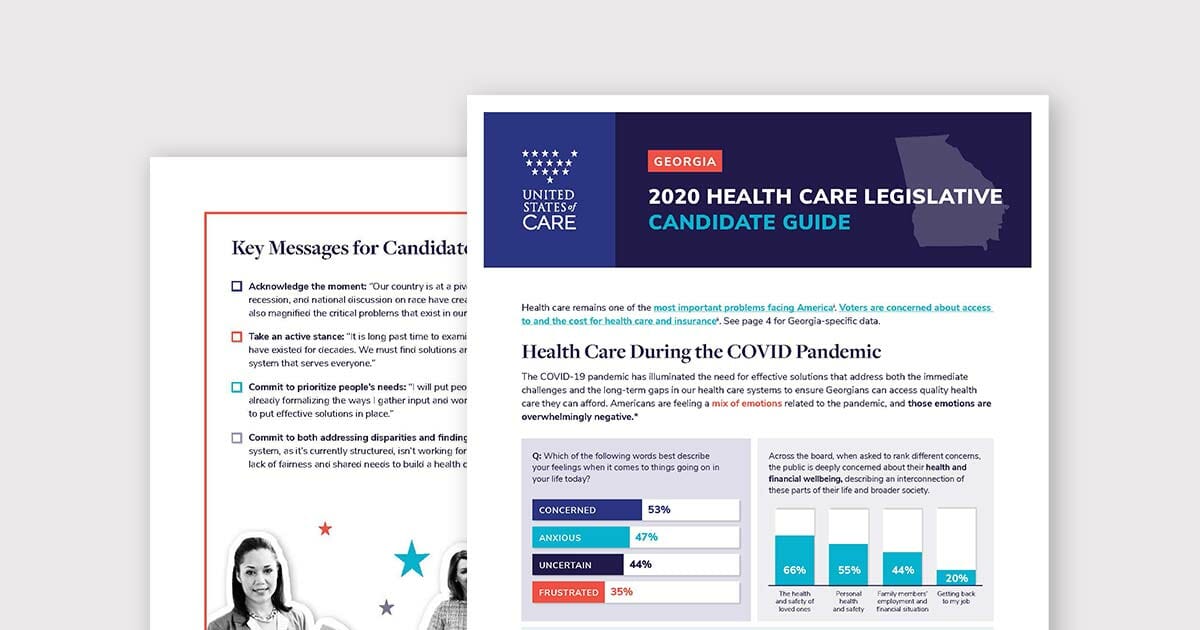Resources, State Efforts
Georgia 2020 Health Care Legislative Guide

Health care access and cost remains one of the most important problems facing America.
- Georgia has the second-highest uninsured rate in the United States (14% in 2018).
- Georgia’s unemployment rate jumped to 12.6% in April on a seasonally adjusted basis. It was 7.6% in June, which likely has severed tens of thousands of Georgians from their employer sponsored insurance.
- The COVID pandemic is drastically impacting insurance coverage for Georgians — 133,000 Georgians enrolled in Medicaid in between May and April of 2020 alone.
- As of June 26, 2020, a disproportionate number of those infected (66%) and those dying (55%) in Georgia are Black, Indigenous, and people of color, who make up only 48% of the state’s population
- Access to health care in rural areas has only become more challenging during the pandemic and will likely have lasting impacts on rural communities. For example, five counties in rural, southeast Georgia depend on Phoebe Putney Memorial Hospital in Albany, which has only 50 ICU beds. A recent Georgia-based study stresses that the rural populations which depend on these sparse beds are at high-risk due to relatively higher age and lower income.
- Seniors are at greatest risk. As of June 26th, 85% COVID deaths in Georgia were among patients aged 60 or older.
- In late April, the Georgia Budget and Policy Institute projected that Georgia would face a $4 billion deficit over the next 15 months.
The COVID-19 pandemic has illuminated the need for practical solutions that address both the immediate challenges and the long-term gaps in our health care systems to ensure Georgians can access quality health care they can afford.
Key Messages for Candidates:
- Acknowledge the moment: “Our country is at a pivotal moment. The pandemic, economic recession, and national discussion on race have created a renewed call for action. They have also magnified the critical problems that exist in our health care system.”
- Take an active stance: “It is long past time to examine our systems and address gaps that have existed for decades. We must find solutions and common ground to build a health care system that serves everyone.”
- Commit to prioritizing people’s needs: “I will put people’s health care needs first and I’m already formalizing the ways I gather input and work with community and business leaders to put effective solutions in place.”
- Commit to addressing disparities and finding common ground: “The health care system, as it’s currently structured, isn’t working for far too many. I will work to address the lack of fairness and shared needs to build a health care system that works for all of us.”
Health Care During the COVID Pandemic
The COVID-19 pandemic has illuminated the need for effective solutions that address both the immediate challenges and the long-term gaps in our health care systems to ensure people can access quality health care they can afford. In the wake of COVID, policymakers have a critical opportunity to enact solutions to meet their constituents’ short- and long-term health care needs. The 2020 Health Care Legislative Candidate Guide provides candidates with public opinion data, state-specific health care information, key messages and ideas for your health care platform.
For more information or to seek assistance, contact USofCare at Help@USofCare.org.